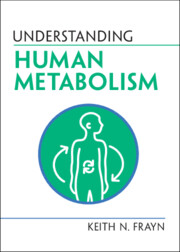Book contents
- Understanding Human Metabolism
- Series page
- Understanding Human Metabolism
- Copyright page
- Reviews
- Contents
- Foreword
- Preface
- Acknowledgements
- 1 What Is Metabolism?
- 2 Metabolic Fuels
- 3 Metabolic Pathways
- 4 Communication Systems in Human Metabolism
- 5 ATP: The Common Currency of Metabolic Energy
- 6 Metabolism in Daily Life
- 7 Metabolism Is So Adaptable
- 8 Metabolic Interactions between Nutrients
- 9 Metabolic Disorders
- Concluding Remarks: Human Metabolism in Context
- Summary of Common Misunderstandings
- References
- Figure Credits
- Index
8 - Metabolic Interactions between Nutrients
Published online by Cambridge University Press: 25 August 2022
- Understanding Human Metabolism
- Series page
- Understanding Human Metabolism
- Copyright page
- Reviews
- Contents
- Foreword
- Preface
- Acknowledgements
- 1 What Is Metabolism?
- 2 Metabolic Fuels
- 3 Metabolic Pathways
- 4 Communication Systems in Human Metabolism
- 5 ATP: The Common Currency of Metabolic Energy
- 6 Metabolism in Daily Life
- 7 Metabolism Is So Adaptable
- 8 Metabolic Interactions between Nutrients
- 9 Metabolic Disorders
- Concluding Remarks: Human Metabolism in Context
- Summary of Common Misunderstandings
- References
- Figure Credits
- Index
Summary
Over 10 years, those of us eating diets typical of Western societies will eat around 1 tonne (1 000 kg) of carbohydrate, and 250–300 kg each of protein and fat. Yet, for many of us, our bodies will change little (maybe a few kg extra or less, but that’s a tiny percentage of what we take in). It just seems unarguable that the body must have ways of adjusting the use (oxidation) of each nutrient in relation to our energy needs, and in relation to other nutrients. And yet many people seem not to believe this. In this chapter we will look at how these nutrients interact metabolically, and (briefly) at some ramifications for what we eat.
- Type
- Chapter
- Information
- Understanding Human Metabolism , pp. 126 - 143Publisher: Cambridge University PressPrint publication year: 2022

